Vomiting and Diarrhea in Dogs and Cats: What Every Pet Owner Should Know
Most pets will have an upset stomach at some point. A single episode after eating too fast may pass on its own, but vomiting or diarrhea can also signal a more serious problem. Gastrointestinal issues can progress quickly, leading to dehydration, electrolyte imbalances, and emergencies if care is delayed.
At Greenfield Veterinary Clinic, we see these cases every day and can often fit urgent concerns into our schedule. With in-house diagnostics, a fully equipped surgical center, and advanced imaging, we find answers fast and begin treatment right away.
Common Causes of Vomiting and Diarrhea in Pets
Pets may vomit or develop diarrhea when the stomach or intestines are irritated or inflamed. This irritation disrupts digestion, causes nausea, and leads to fluid loss through loose stools.
Frequent triggers include:
- Eating too quickly or scavenging spoiled food, leading to gastric irritation
- Sudden diet changes or food intolerances that upset the digestive balance
- Stress, anxiety, or motion sickness that affect gut motility
- Hairballs in cats, which irritate the stomach lining
- Parasites or bacterial infections that inflame the intestines
- Exposure to toxic plants, medications, or household chemicals
- Chronic illnesses affecting the kidneys, liver, pancreas, or thyroid
While some of these causes are minor, others require immediate veterinary care to prevent complications.
When Vomiting and Diarrhea Are Veterinary Emergencies
While a single episode of stomach upset may pass quickly, some signs mean your pet cannot wait for a routine appointment. Pay special attention to puppies and kittens, as they dehydrate very quickly and without full vaccinations, they run the risk of having very serious infections. Contact a veterinarian immediately if you notice any of the following:
- Blood, black, or tarry material – This may signal internal bleeding, ulcers, or severe infections in the stomach or intestines.
- Fever, lethargy, or severe abdominal pain – These systemic signs suggest something more serious than simple indigestion, such as infection, pancreatitis, or organ disease.
- Persistent vomiting or diarrhea lasting more than 24–48 hours – Ongoing fluid loss can cause dangerous dehydration, especially in puppies, kittens, or senior pets.
- Rapid weight loss or severe dehydration – Visible ribs, sunken eyes, or loss of skin elasticity indicate a medical crisis.
- Repeated retching without producing vomit – This can be a warning sign of bloat (GDV), which is rapidly fatal without emergency surgery.
At Greenfield Veterinary Clinic, emergencies are handled in-house during regular hours, with our team trained to triage cases over the phone and prepare for immediate stabilization on arrival. If advanced care or transfer is required, our doctors will stabilize your pet for safe transport to a specialty center.
Serious Medical Conditions That Cause Digestive Upset
Persistent vomiting or diarrhea may point to hidden health problems. Understanding what these conditions do to the body can help pet owners act quickly.
- Pancreatitis: The pancreas becomes inflamed, often after eating fatty foods. Digestive enzymes leak into the abdomen, causing severe abdominal pain, vomiting, diarrhea, and sometimes life-threatening shock.
- Chronic kidney disease in cats: Diseased kidneys cannot filter toxins efficiently. These toxins build up in the blood, leading to nausea, vomiting, weight loss, and ulcers in the stomach lining.
- Hyperthyroidism in cats: Excess thyroid hormone speeds up metabolism, causing restlessness, weight loss, and frequent vomiting or diarrhea from overstimulation of the digestive system.
- Liver disease in dogs and cats: The liver filters toxins and helps digest fat. When diseased, bile builds up in the bloodstream, leading to vomiting, diarrhea, jaundice, and loss of appetite.
- Lymphoma: A cancer of the lymphatic system that often targets the GI tract. Pets may experience chronic diarrhea, vomiting, weight loss, and lethargy.
- Inflammatory Bowel Disease (IBD): Chronic inflammation of the intestines disrupts absorption of nutrients and causes repeated vomiting and diarrhea.
- Parasitic infections: Diarrhea in dogs and cats may be linked to roundworms, hookworms, or giardia. Year-round parasite prevention is critical.
- Parvovirus: This viral disease destroys the intestinal lining, causing bloody diarrhea, vomiting, and rapid dehydration in dogs, especially puppies. Puppies and unvaccinated dogs need aggressive hospitalization.
- Foreign body ingestion: Pets that swallow toys, bones, socks, or string can develop life-threatening intestinal obstructions. Surgery is often required.
- Bloat (GDV): Gastric dilatation-volvulus twists the stomach, cutting off blood supply. Large, deep-chested dogs are at highest risk. Without surgery, GDV is fatal.
How Veterinarians Diagnose Vomiting and Diarrhea
At Greenfield Veterinary Clinic, we use advanced diagnostics to uncover the exact cause of GI distress. Testing may include:
- Bloodwork: Evaluates organ function, electrolytes, and infection markers.
- Urinalysis and fecal exams: Detect parasites, bacteria, or changes linked to kidney and metabolic disease.
- Digital X-rays: Reveal obstructions, foreign bodies, or abnormalities in the stomach and intestines.
- Ultrasound: Provides real-time imaging of soft tissues, including liver, kidneys, and pancreas.
- Endoscopy: Minimally invasive viewing of the stomach and intestines to detect ulcers, inflammation, or blockages.
These tools allow us to diagnose accurately and treat quickly, whether that means IV fluids, medications, or surgery.
At-Home Care for Mild Upset in Dogs and Cats
For pets who are bright and alert, mild GI upset can sometimes be managed at home:
- Withhold food for 12–24 hours, then offer bland meals like boiled chicken and rice or a veterinary prescription bland diet
- Provide frequent small sips of water or pet-safe electrolyte solutions
- Monitor hydration using a DIY dog checkup and note bathroom habits
- Resume a normal diet slowly after symptoms improve
If symptoms worsen, return, or new ones appear, veterinary attention is essential.
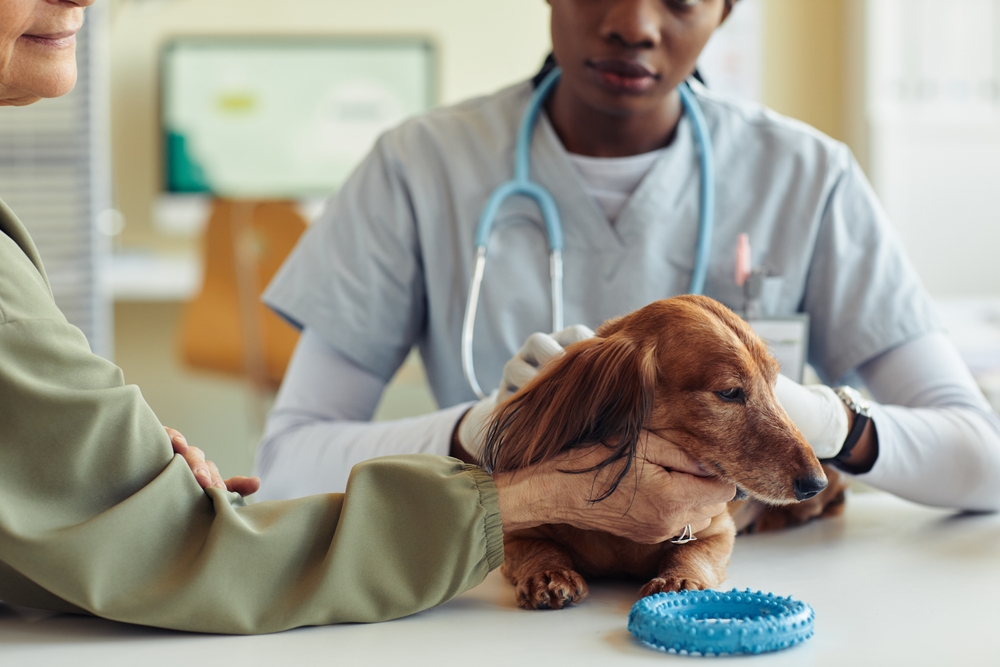
Preventing Vomiting and Diarrhea in Pets
Not every episode of stomach upset can be prevented, but many causes are avoidable with consistent care. Prevention keeps your pet comfortable and reduces the risk of costly emergencies.
- Routine wellness exams: Regular checkups catch subtle changes before they become serious.
- Year-round parasite prevention and vaccination: Protects against worms and viruses like parvovirus.
- Feeding practices: Stick to balanced diets, avoid table scraps, and make diet changes gradually over 7–10 days.
- Toxin-proofing your home: Secure garbage and keep toxic plants, medications, and chemicals out of reach.
By taking these steps with guidance from the Greenfield Veterinary Clinic team, you can significantly lower your pet’s risk of digestive upset and protect long-term health.
When to Call for Help with Your Pet’s Digestive Health
Vomiting and diarrhea can start as small problems, but they can escalate quickly. If you are worried about your pet, we want you to know that we take that worry seriously. Trust your instincts- if your dog or cat seems weak, dehydrated, or cannot keep food or water down, it is always safest to reach out.
At Greenfield Veterinary Clinic, our culture of caring means we treat every pet like family. If you are concerned, we are concerned, and we are here to help. With on-site emergency services, advanced diagnostics, and a fully equipped surgical center, our team is ready to find answers and provide relief.
It is that dedication to both pets and their families that earned us recognition as the “Face of Healthy Pets” by Milwaukee Magazine. Do not wait and wonder- contact us today so we can work together to restore your pet’s health and give you peace of mind.


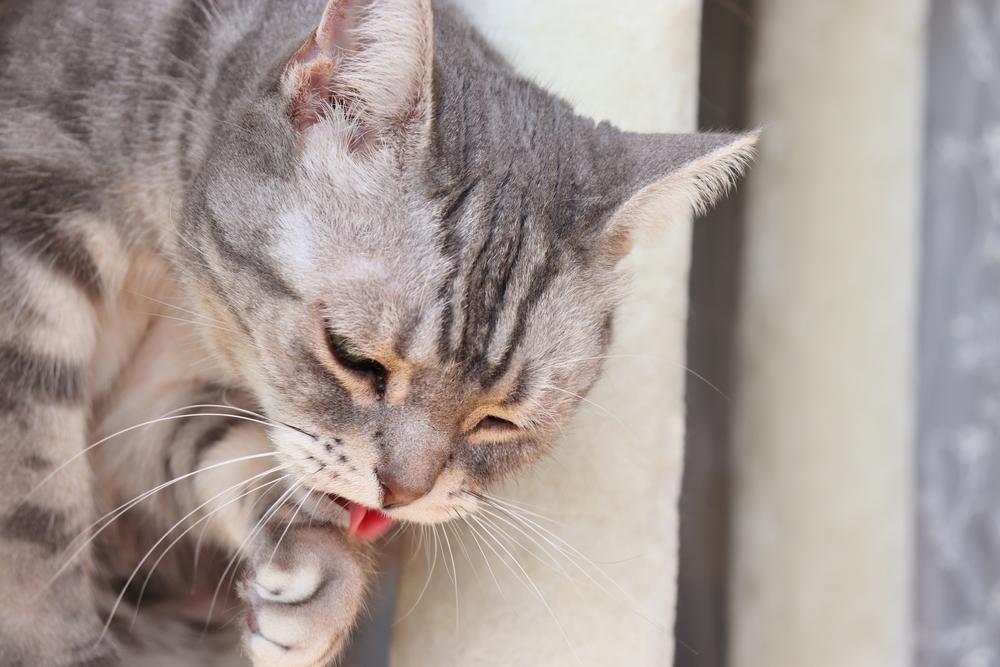

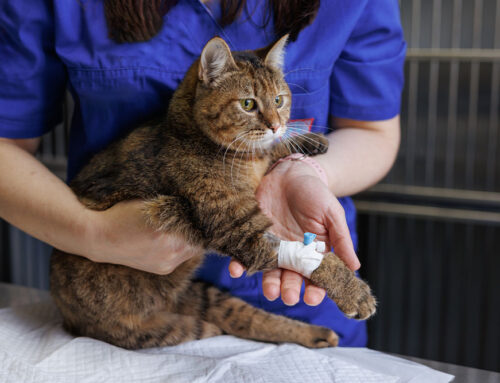
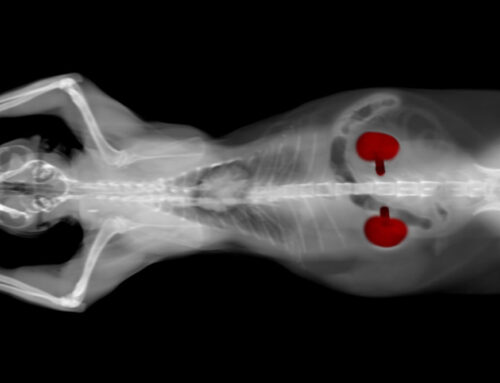
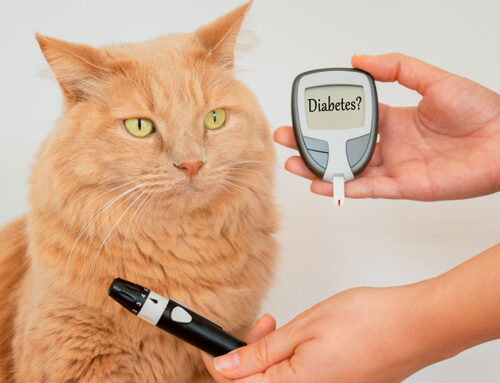
Leave A Comment